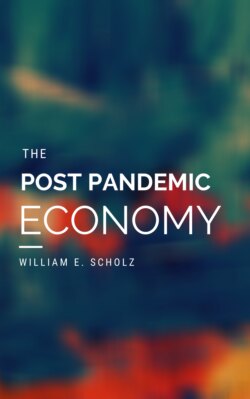Читать книгу The Post Pandemic Economy - William E. Scholz - Страница 20
На сайте Литреса книга снята с продажи.
Example #1: An 'Overheated' Economy
ОглавлениеIn the run-up to the coronavirus induced financial panic, financial intermediaries created an 'overheated' economy. This simply means that producers are not able to meet aggregate demand. There are two points we aim to make here.
1 Instead of launching large-scale building initiatives, financial intermediaries turned to consumerism in the final decades of the post-War economy. Consumerism has been one of the most misguided economic strategies in the history of the world, not for its outcome, but because it was an economic policy shaped entirely by the geopolitics of trade.
2 An overheated economy is one of the only tools that an economy built on debt can rely on in times of financial crisis. This is simple logic. If an economy built on a private sector needs stimulated, the easiest place to turn is consumer spending as opposed to large-scale Government building initiatives. The problem with overheating an economy, as we have seen, is that consumer demand is not reliable during times of financial crisis. The same lesson of the "credit crunch" in ‘08-09, happened during the coronavirus pandemic.
Overheating an economy is usually the correct decision for policymakers during times of peace and prosperity. It is also what leads to an inevitable downfall during times of crisis. The economy is a complex system with many moving parts. The decision to overheat the economy post ‘08-09 was not an incorrect policy decision. However, the fact that policymakers must rely on ineffective tools speaks to the foundational weakness of a debt-driven, Federal Reserve based economic order. We cannot go back!
One of the first recorded examples of overheating an economy dates to The Roman Empire in 33 AD. Let's explain this simply. A long-standing policy that required wealthy nobles to purchase Roman land had been repealed during the times of Julius Caesar, then re-instituted causing a demand shock overnight [3]. The result was a credit crunch and a bail-out. We know this history all too well.
The Roman Financial Crisis of 33 AD highlights the arc of the world's financial history and just how long humankind has experienced the same financial turmoil. The only possible recourse is a bail-out from those with the means to offer it. In Rome's case, the bail-out came from the Emperor. In recent times, the bail-out comes from the Federal Reserve.
The Roman Financial Crisis came amidst a period of great upheaval in the Roman Empire, obviously foremost, the collapse of the Republic. Both Julius Caesar and Octavian Augustus offered some of the largest bail-outs in history to quell public discontent.
The financial bailouts, like today, threaten the integrity of our Republic. A financial bail-out erodes public integrity even when well-intentioned or necessary. And it did in Rome, first leading to the death of the Triumvirate, then the murder of Julius Caesar and the Crowning of Emperor Augustus.
Consumerism is great, but not as a foundational component of the financial economy because it is too subject to the whims of public opinion, panic, and trends. In a debt-based system, consumerism is the only recourse for re-stimulation.
The Geopolitics of Consumerism. The outcome of the debt-based system skews our geopolitical relationships. Trade devolves into trade deals that do not support the American people or National Interest but support the interests of a global financial class. State economies are often used as "vassals" on behalf of this class to offer the production of cheap consumer goods.
Again, consumerism is great, but should be done on a fair landscape and should not underpin the economy. Innovation, competitive entrepreneurship, and workforce development (the training and maximized potential of the worker) must be the values of The New, Global Economic Order.
If we do not place the values of the human spirit highest in the financial order, we will tolerate oppressive regimes, manifest an order that devalues human labor and the creative will, and ultimately an order that leads to War. This debt-based order and spectrum, from oppression to war, is the history of the world for as long as we can remember.
Oppressive regimes such as China, and its network of vassals, and prior to China the Soviet Union, all were regimes that devalued the human spirit. In today's world, somehow we find ourselves in a situation where the global financial order has supported an oppressive Socialist regime, The People's "Republic" of China, in order to advance the cause of consumerism, debt, and globalist trade deals.
When the historians look back upon the 20th and early 21st century, they will likely ask the question: why did we tolerate such oppressive regimes? The answer is clear, we let our debt-based financial order oppress the True Spirit of humanity!
